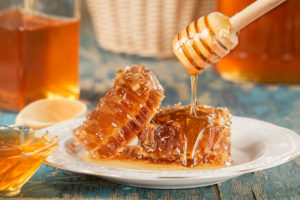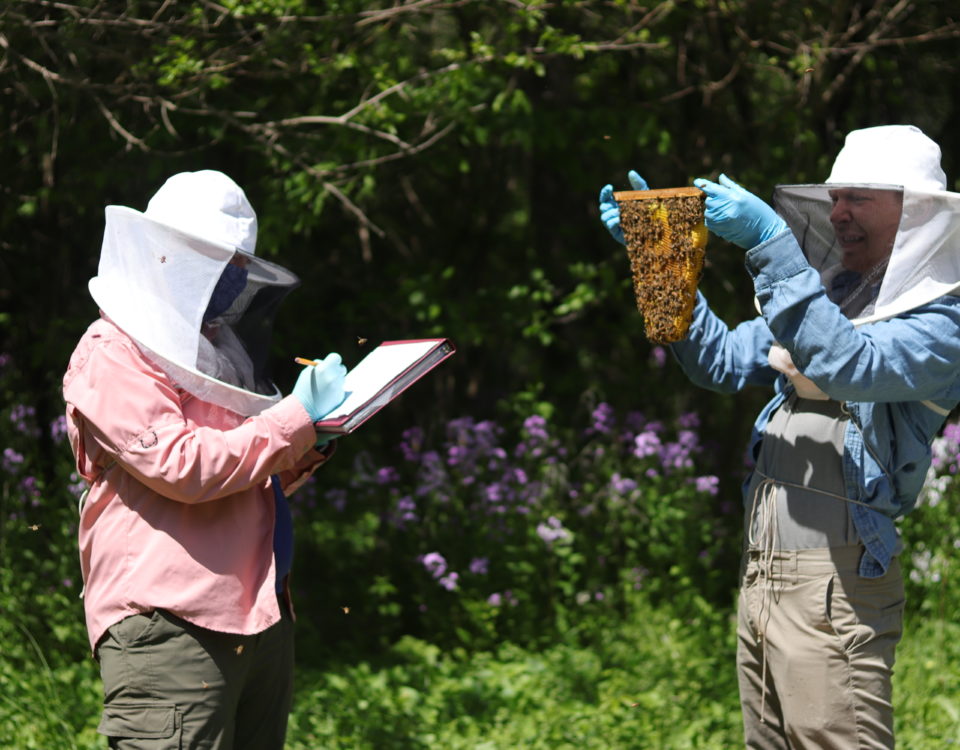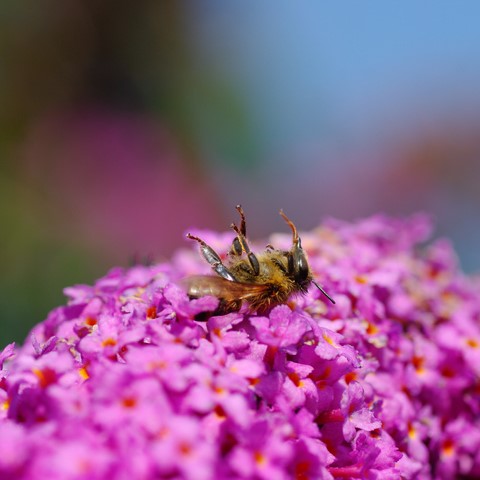- All-In-One Beekeeping for the Bees
- +1-608-728-8233
- [email protected]
Pollinator Week: How COVID-19 And Modern Technology Have Impacted Bees
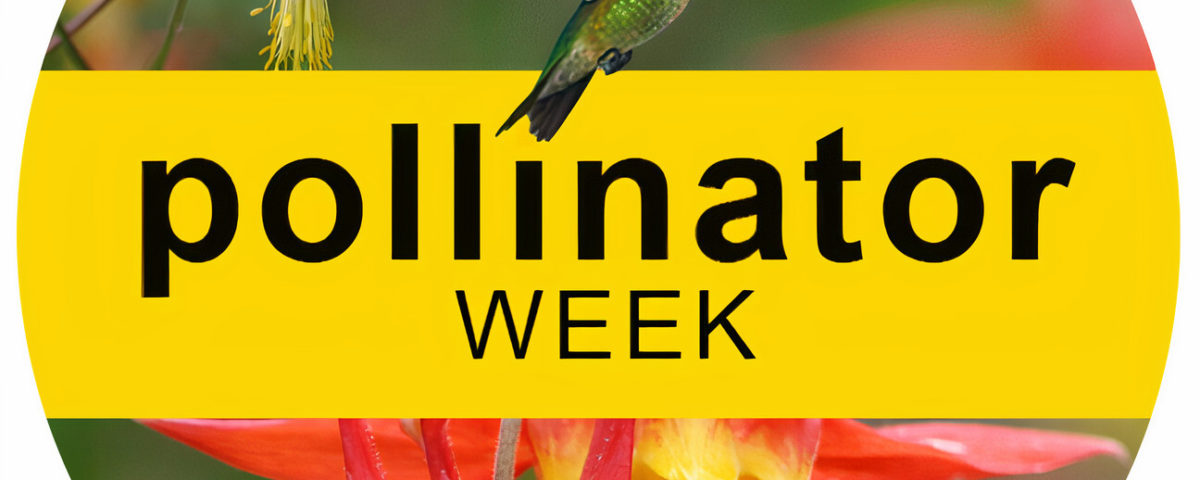
How the global pandemic impacted honey bees, beekeepers, and the environment, and how using modern technology can help beekeepers adopt and spread the word about helping to save the bees.
“Where were you when you first heard about COVID-19?”
It’s a guarantee that this will be one of the number one ice breaker questions for the next few decades. Everyone on the planet, those old enough to remember anyway, will have their own COVID story to share. It’s something we’ve all experienced, something we all have in common, though our opinions may differ on the subject. When news broke that the country was going into the first round of stay-at-home orders, it impacted everything. Concerts, sports, education, shopping, our jobs, and even beekeeping. But, like any creature thrown off its daily routine, we did what we had to: we adapted, just like bees have done for thousands of years.
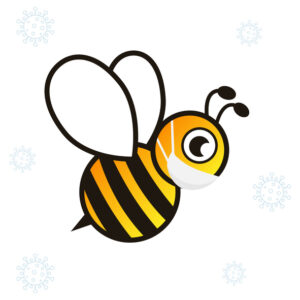
From our food to our health and our economy, pollinators play a vital role in the way we thrive as a society. Without them, the world may as well stop spinning.
This Pollinator Week, let’s celebrate the impact that pollinators have on the globe by talking about how modern technologies kept the bee world turning during COVID-19.
Adapt
Newbees
Imagine getting your first Beepod. You’ve done all the research you can, you’ve sited your hive properly, you’re ready to get your bees, find your beekeeping mentor, and kick off the spring! As a newbee, you’re probably a bit nervous, so you’re looking forward to learning from your mentor. Now imagine a global pandemic hits and you’re not allowed to meet face to face anymore.
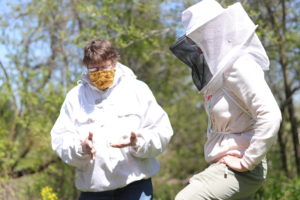
This was the reality for hundreds of new beekeepers across the globe. There are many reasons why beekeepers need to connect. Here’s just a few:
- Reassurance- You want to make sure you’re doing it right, right?
- Get questions answered
- Feel like you’re part of something bigger
- Mentorship- someone to show you the ins and outs of the industry
- Confidence boost
- Community
So, what happened during the first stay-at-home order? How did newbees find the answers to their questions and learn valuable beekeeping lessons? They went virtual.
Social Distance
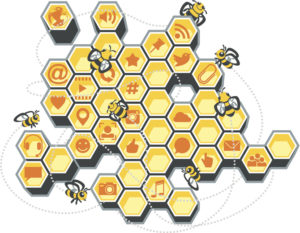
Love or hate social media, it played a major role in helping people connect during the pandemic. Most social media apps have their own chat and video chat features, as well as the ability to quickly and easily share lots of information. During the pandemic, many new beekeepers turned to apps like Facebook to join local beekeeping groups. There, they found mentors, answers, and a sense of community.
Are You Looking
for great, local beekeeping groups in your area? Click the link below to get connected today!
Social media was and still is a great tool for connecting to the beekeeping community across the country and the world. It helped promote honey sales, spread awareness, and help others learn about bees. But, we’ll dive deeper into that later.
Virtual Is All The Buzz
Before the pandemic, Beepods was already working on a virtual learning module called Beepods Lab to try and educate as many beekeepers as possible. During the pandemic, this was one of the best beekeeping tools to have. Not only did a lab membership give you access to hours of training videos, and printouts, we also helped beekeepers connect with an exclusive members-only community to answer all your questions.
At Beepods, we know that to be a good beekeeper you have to adapt and change with the times whether that be a global pandemic or implementing new technology, or by creating more versatile education sources for all levels of beekeeping. During the pandemic, we even created our BeeEducated podcast to help connect listeners with teachers and other bee experts. Researchers discover more about bees and beekeeping every day and we want to make sure you’re staying up to date so you can level up your beekeeping!
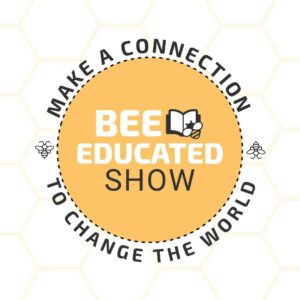 One of the best parts of Beepods Lab is that you can print off all the sources and guide the kids in your life through hands-on activities offline. Virtual learning may be more accessible but it’s by no means the easiest option. During the pandemic, we were all glued to so many screens, but Beepods Lab activities help get you and your kids outside exploring different pollinator habitats and learning about the world around them.
One of the best parts of Beepods Lab is that you can print off all the sources and guide the kids in your life through hands-on activities offline. Virtual learning may be more accessible but it’s by no means the easiest option. During the pandemic, we were all glued to so many screens, but Beepods Lab activities help get you and your kids outside exploring different pollinator habitats and learning about the world around them.
Impact
The pandemic impacted everyone. Right, you’ve heard that enough times to make you sick. But, it had a unique impact on beekeepers and the environment. While we were all under the stay-at-home orders, we, as humans, had less of a negative impact environment, we saw a rise in sustainability efforts, and a bump in honey sales.
Oh, Honey!
During the pandemic, agricultural business, such as beekeeping, was considered essential. Bees after all help pollinate one in every three bites of food we take. While beekeepers worked hard during the pandemic to keep their bees happy and healthy, they also began to notice an impact on their honey sales.
During 2020, the demand for honey skyrocketed. Why? It could be that honey is comfort food, while others think it has something to do with the added health benefits that honey may provide when it comes to preventing COVID-19, though it’s not 100 percent certain. However, commercial beekeepers are having trouble turning a profit on their honey due to the US importing honey from abroad at less than half the cost. It’s especially disturbing to find out that this honey isn’t even quality; it’s often mislabeled or made with extra ingredients to prolong the shelf life.
Instead, what you can do to help is buy pure honey directly from the local beekeeper. Remember how we banded together to support local and small businesses during the pandemic? Buying from your local beekeeper or farmer’s market is a great way to support your community and the bees! For example, Illinois beekeeper Eugene Makovec, ran out of honey to sell last year after a huge spike in demand.
Manuka Honey sales are also set to see a steady increase due to the COVID-19 pandemic. Honey has excellent health benefits. It can help boost your immune system, treat sore throats and colds, it’s antiviral and anti-inflammatory. It also tastes a lot better than most vitamins. While bees and their honey helped keep people healthy, we also saw that COVID may have helped keep bees healthier also.
A Push For Sustainability
During the pandemic, there was less travel, less industrial pollution, and less pesticide use, which meant cleaner air and resources for everyone, especially the bees. While it’s not uncommon for beekeepers to experience colony loss, during the pandemic, beekeepers saw a 25 percent drop in colony losses over winter. How fantastic is that?
A study found that during the pandemic the levels of air pollution in New York City were cut by nearly 50 percent. This drop was mostly due to low vehicle emissions. Water pollution and noise pollution decreased too. Clean water helps grow healthy plants that bees and other pollinators need. And for the humans reading this, noise pollution can have a lot of adverse effects on our mental health and can also cause sleep issues.
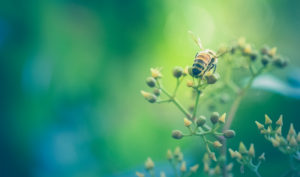
During the pandemic, we did still see negative impacts on the environment. Now, it’s common to see disposable masks and gloves washing up on beaches or stuck in trees or shrubs. Take away one negative environmental impact and we’ll replace it with another.
However, it became abundantly clear that a cleaner and more sustainable way of life is key to ensuring that we all thrive on this planet. Look at what a few months of lowered emissions did for bee populations. Look what it did for our water and our air. Fossil fuels are a thing of the past, the future needs to be sustainable or we won’t have bees and other pollinators to pollinate our food. Without them, we won’t make it very long.
Have you…
Checked out our BeeEducated Podcast yet?
Tune in to episode 9 to learn more about the impact of COVID-19 on the environment! Listen below.
We may doubt one person can have an impact on the world. But, think of it this way. One little honey bee can fly up to 5,000 flowers in a single day. Right, that sounds crazy so we found two sources to prove it. If one bee can do all that, just think of the impact one person can have. Now multiply the actions of one bee by 60,000. A single person can have a bigger impact on the plant than you may think. So, as the term “normal” starts being used to describe life again, what can you do to lessen your impact on the environment?
Aftermath
Life is beginning to shift back to normal. Or, the new normal anyway. I’m sure we’ve all learned a lot from the pandemic. It’s been eye-opening for us here at Beepods. We’ve learned to not take anything for granted and to be as resilient as our little pollinator friends. We’ve also learned that modern technology helped us make it through the pandemic and are continuing to help us adapt and learn. COVID-19 changed the world, and we are going to work hard to make sure the pandemic changed the world for the better.
Education For The Sustainable Future
At Beepods we’ve believed in a sustainable future from the beginning. We’ve always built our hives out of sustainable and natural materials, and we always recommend using prevention methods or natural treatment when it comes to dealing with hive pests and illness. We want to help educate current and future generations on how they can be better beekeepers for the bees and the planet.
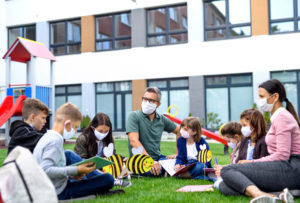
Through Beepods Lab’s member’s area and BeeEducated podcast, we are well on our way to positively impacting education for the future. If you’re a teacher or school administrator, we have lots of other resources to help you bring bee education into your school.
These are great lessons that will kick-start your knowledge on how to create a more sustainable future. Being educated is key to making long and lasting changes. Our lessons suggest cutting back on pesticide use, using renewable products in your everyday life, and being mindful of the environment around you. Every creature on Earth deserves a safe and clean place to live. From humans to the birds, and the bees.
Once you’ve educated yourself, it’s time to start educating others. Be like a honey bee and spread your information to 5,000 people, so they in turn can spread it to another 5,000 people. What’s the best way to do this? Modern tech has got our back again.
Social Not Distant
Earlier we mentioned how beekeepers were connecting with other beekeepers during the pandemic through apps like Facebook. Utilizing social media is another great way to spread awareness about bees, pollinators, and sustainability.
During the pandemic, the use of social media increased by 61 percent with Facebook engagement increasing by 37 percent. With more and more people scrolling through their social media, with no sports or non-pandemic news on TV, beekeepers and other bee activists saw an opportunity. After seeing the positive effects that COVID was having on the environment, activists hit social media harder than ever with sustainability and save the bees campaigns. Why? Because now was the time to get people engaged. And many of them are choosing a more sustainable future.
According to the BBC, 60 percent of people are now making more sustainable and ethical choices when it comes to buying consumer goods. And once the pandemic is completely over, 9/10 people will continue to do so. This relates back to the idea that the pandemic showed us all that really mattered in life. Buying more ethically sourced items also helps to maintain the local economy, including supporting local beekeepers by buying local honey directly from the source. If technology can help spread the word about a more sustainable future, and help the bees, what else can it do?
Modern Beekeeping Technology
At Beepods, we believe in Beekeeping for the Bees. We use the best methods possible to make sure our bees are happy and healthy. Sometimes that means implementing modern technology. At Beepods we use Healthy Hive Management Software. What this helps you do, is keep track of all your hive inspection data in one place. Then you can submit that info so that we can keep track of beekeeping data for the surrounding area. It’s also a great tool to use if you need help identifying a problem or monitoring the overall health of your hive. You can also see data from other beekeepers to see if there are problems to avoid or things to watch for. Think of it as its own mini beekeeping Facebook. We’re actively building a list of people who would like to beta test our new software. If you’re interested, get in touch with us! [email protected]
There are other similar software programs out there that help keep track of hive health for larger apiaries or for beekeeping organizations that have hives spread throughout a city. In this article from the BBC, Noah Wilson-Rich, chief scientific officer of Best Bees Company uses hive software technology to keep track of beehives all over the Boston area. He then sends the data to Harvard University where it can be studied to better understand what factors are impacting honey bees.
Another fun tech option beekeepers and bee enthusiasts can use is the BeeSmart Pollinator Gardener app from Pollinator Partnership, the curators of Pollinator Week! It’s a great app to help you find the right plants to grow for pollinators specifically in your area!
These modern technologies are helping to educate more people on the importance of bees, ways they can help support bees, and collect more data on how to keep your apiary healthy and thriving all while most of us weren’t even allowed to leave our homes. What will technology do next?
Looking To The Future
We’re at the apex of change again. Going back to work in person, kids playing organized sports again, people meeting up for drinks and food at bars and restaurants. The world spins on. Without technology at our fingertips, the pandemic and the impact it had on pollinators could have been drastically different. It’s been over a decade since scientists first announced that bee populations were suffering and that climate change was one of the leading factors.
But, it took until we no longer had so many distractions in our day-to-day lives and saw the environmental benefit of reducing fossil fuel emissions. We decided to take a more serious step towards a sustainable future. Because adapting to a world that isn’t sustainable and doesn’t have bees, isn’t an option.
As new data and technologies come to market, we will do our best to learn and understand them so that we can pass that knowledge on to you. If you have any questions about beekeeping or our beekeeping software, please email us at [email protected].
Sources:
Chicago Sun Times (Dec 2020)- COVID-19 has mixed impact on beekeeping
https://chicago.suntimes.com/columnists/2020/12/27/22199028/covid-19-impact-beekeeping-bees-honey
Kantar (2020)- COVID-19 Barometer: Consumer attitudes, media habits and expectations https://www.kantar.com/Inspiration/Coronavirus/COVID-19-Barometer-Consumer-attitudes-media-habits-and-expectations
Science Direct (Dec 2020)-Prospects of honey in fighting against COVID-19: pharmacological insights and therapeutic promises
https://www.sciencedirect.com/science/article/pii/S2405844020326414
BBC News (June 2020) US beekeepers fear for their future
https://www.bbc.com/news/business-53149367
Globe Newswire (May 2021) Manuka Honey Market Forecast to 2028 – COVID-19 Impact and Global Analysis By Nature, Type, and Distribution Channel
National Center for Biotechnology Information (Sept 2020) Environmental effects of COVID-19 pandemic and potential strategies of sustainability
https://www.ncbi.nlm.nih.gov/pmc/articles/PMC7498239/
Manuka Honey USA (July 2020) Updated COVID-19 Report: COVID-19 Shutdown May Have Helped Honey Bees
https://manukahoneyusa.com/updated-covid-19-report-covid-19-shutdown-may-have-helped-honey-bees/
Wonderopolis.org- How many flowers can a bee pollinate
https://wonderopolis.org/wonder/how-many-flowers-can-a-bee-pollinate
Bayer Health- How many flowers can a bee pollinate
https://beehealth.bayer.us/learn-about-pollinator-health/pollinators-101/bee-facts
BBC (Jan 2021) Has coronavirus made us more ethical consumers?
https://www.bbc.com/news/business-55630144
Monica Cull
Latest posts by Monica Cull (see all)
- How To Keep Your Bees Calm During An Inspection - June 30, 2021
- Pollinator Week: How COVID-19 And Modern Technology Have Impacted Bees - June 23, 2021
- Bee-Themed Activities You Can Do With Your Kids This Summer - June 17, 2021

